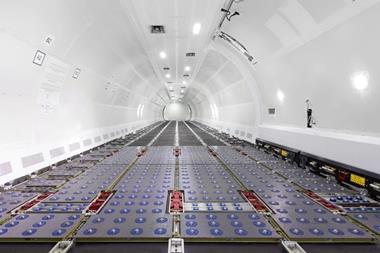While the value of air cargo was the leitmotif of IATA’s World Cargo Symposium (WCS) in Berlin, safety was also to the fore, focused on the lithium-ion battery debate and on how to prevent damage to ULD containers.
At the end of the four day event, Glyn Hughes, IATA’s global head of cargo, said that the symposium had created the framework for supply chain participants to “share experience and challenge each other, not just to do things differently but to do them better”.
Lithium-ion batteries, soon to be subject to an interim ban as belly cargo on passenger aircraft, had been prominent from the first day plenary session, which saw speeches from Dr Fang Liu, secretary general of United Nations aviation regulatory body ICAO, and Tony Tyler, secretary general of IATA.
Said Liu: “This interim prohibition will continue to be enforced until the adoption of new lithium battery [fire-resistant] packaging performance standard," adding that she welcome advice and input from the air cargo industry.
Tyler pointed out that some 400m lithium-ion batteries are produced each week, with safety concerns about irregular manufacture, mislabelling and improper packing, including non-compliance with dangerous goods regulations and the IATA Lithium Battery Shipping Guidelines.
He added: “Safety is the top priority. Banning lithium-ion batteries from airfreight does not solve the issue of counterfeit or non-declared goods.
“The issue lies with the lack of enforcement of the regulations by governments. So it is essential that authorities redouble their efforts to enforce the regulations and close the loopholes that prevent prosecutions of serial offenders.”
Talking after the event, Hughes said that it was important for states and governments to “play a much larger role” in what lithium battery manufacturers are doing, particularly in China and South East Asia.
He echoed the point that governments should act together to tackle the problem of illicit and counterfeit lithium batteries. Hughes revealed that even while the WCS was in progress, one shipment of so-called appliances with lithium batteries had in fact been found to contain lithium batteries on their own.
“People are not in compliance today with current regulations, so why would they comply with the interim ban?”
IATA would like to see a method of reporting non-compliance incidents put in place, rather than relying on “anecdotal evidence”.
Such a reporting regime, said Hughes, would “identify serial offenders or organisations” putting such potentially dangerous material into the air cargo supply chain, subject to confirmation of guilt in a court of law.
On unit load device (ULD) safety and damage reduction, Hughes said that the new awareness campaign launched by IATA would make the point that a container is as much an aircraft component as a wing, and should be treated as such.
Ironically, ULDs are also the single highest cause of damage to aircraft on the ground, usually a consequence of prior mishandling off-airport when the container is often bashed and battered in warehouses and trucks.
Once again, improved damage incident reporting and proper staff training are key areas when the problem of poor ULD handling can be tackled.
The cost of training staff in ground handling operations may be relatively high, and so there has tended to be a reliance on historic practice within this sector of the industry.
“Historic practice breeds historic practice going forward and that can be bad practice,” observed Hughes.
The baton for the next WCS has been passed to Abu Dhabi. The event will be held at the Abu Dhabi National Exhibition Centre (ADNEC) from March 14-16, 2017, and will feature IATA’s innovation award scheme and the Future Air Cargo Executives (FACE) programme.
At the end of the Berlin WCS, more than 1,100 delegates had listened to 55 hours of industry focused debate, during which time there had been 300,000 flights, 385,000 shipments, 20m express shipments, 550,000 tonnes handled, all with a total commercial value of $42bn.
Those few figures indicate the real value of air cargo.










